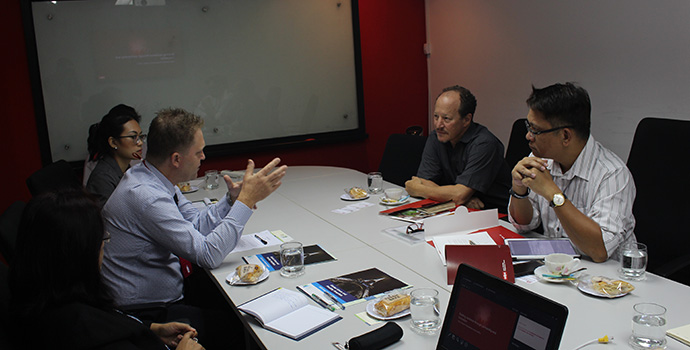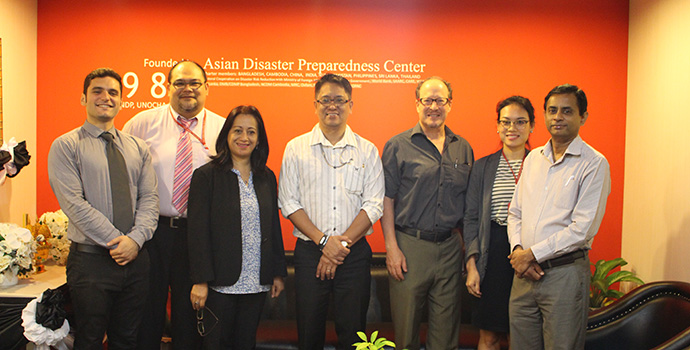- About Us
-
Who we are
-
- Publications
-
- ADPC Academy
-
MediaADPC'S NEWS
ADPC aims to make healthcare facilities more resilient and environmentally friendly with new partnerships ADPC aims to make healthcare facilities more resilient and environmentally friendly with new partnerships
1 Feb 2017
Thailand, Bangkok
Representatives from Health Care Without Harm, a non-governmental organization working to make the healthcare sector more sustainable, visited Asian Disaster Preparedness Center (ADPC) to discuss the possibility of both organizations working together in the future.
The meeting focused on using capacity building to help make hospitals in the Asia Pacific more resilient to disasters while simultaneously lessening their impact on the environment.
Mr. Hans Guttman, Executive Director, ADPC, opened the meeting with a lively discussion about ADPC’s ongoing work and areas that overlap with the initiatives of Health Care Without Harm.
“Green, safe, resilient and low carbon – these are notions that we can work together on and put into a training module,” said Mr. Ramon San Pascual, Director, Health Care Without Harm – Asia.During the meeting ADPC invited Health Care Without Harm to integrate their Green Hospital initiative, which aims to make hospitals more environmentally friendly, at the 11th Regional Course on Hospital Emergency Preparedness Response in August 2017 in Bangkok.
These types of joint initiatives can set the stage for other collaborations in the future.
“I think the comparative advantage of both organizations are the relationships we have with governments, health administrations, international organizations and others that can help us role out initiatives visa-vie our networks,” said Josh Karliner, International Directors Program and Strategy Healthcare Without Harm.
ADPC became connected with Healthcare Without Harm in July 2016 when ADPC joined the Global Green and Healthy Hospitals network. This network, which Healthcare Without Harm created, enables organizations to better collaborate within the international community of hospitals, health systems, and health organizations. The network is also dedicated to reducing the health sector’s ecological footprint and to promote the well-being of patients, hospital staff and the entire community.ADPC’s dedication to resilient hospitals
ADPC is well versed in programs that build the capacity of hospitals to be prepared for emergency situations. One of which is the Hospital Preparedness for Emergencies (HOPE) South Asia program, which was implemented in India, Nepal, Pakistan, Bangladesh, Sri Lanka and Afghanistan. The program trained hospitals personnel in charge with emergency planning to create facility-specific plans to ensure the hospital can handle mass casualty incidents following a disaster.
Similarly, SERB Bangladesh and the Program for Enhancement of Emergency Response (PEER) also includes capacity building activities to conduct hospital risk assessments, emergency response planning, simulation exercises, and hospital ICS so that healthcare facilities can remain operational after a disaster.

Representatives at the meeting include (from left) Mr. Don Tartaglione, Communications Coordinator, ADPC, Mr. John Abo, Program Manager, Public Health in Emergencies (PHE), ADPC, Dr. Yvonette Duque, Senior Public Health Specialist, PHE, ADPC, Mr. Ramon San Pascual, Director, Health Care Without Harm – Asia, Josh Karliner, International Directors Program and Strategy Healthcare Without Harm, Ms. Nattayaporn Cocconi, Administrative Coordinator, PHE, ADPC, and Dr. Senaka Basnayake, Department Head, Climate Change and Climate Risk Management, ADPC.Latest NewsRelated Trainings
-